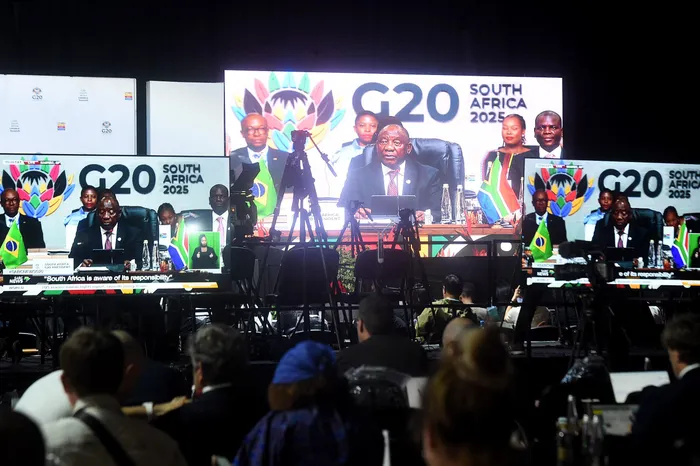G20 Summit urges action on Africa's debt and development challenges

President Cyril Ramaphosa makes his opening remarks at the G20 Leaders' Summit held at the Nasrec Expo Centre in Johannesburg on Saturday.
Image: Itumeleng English / Independent Newspapers
The global leaders gathered at the G20 Leaders' Summit have unanimously endorsed the recommendations set forth by the Report of the South Africa G20 Africa Expert Panel.
Leaders said the bloc must ensure the voice of the Global South is amplified in all global institutions, acknowledge the need for growth based on shared rules and fair trade, the rethinking of how global financial institutions operate and how to relieve the debt burden on developing countries.
This report, recently handed over to President Cyril Ramaphosa, demanded a shift from old development paradigms, which viewed countries in the Global South as mere export centres for raw materials.
It also called for bold multilateral action to transform Africa's development path. Further, it recognises the key role of the African Development Bank Group in realising productive investment across the continent, urging Africa to maintain high levels of economic growth.
Part of its plan is a call for Africa to expand its transformation and expansion of its workforce to ensure global prosperity in a bid to reverse the inequalities that continue to enslave the continent and its economy with perpetual debt.
About 42 countries and institutions were represented at the meeting on Saturday, but the US, under President Donald Trump – who has condemned South Africa’s position as host – was absent.
Italy used the meeting to commit to halving the debt owed by African countries by 50%, with Prime Minister Giorgia Meloni saying they will ensure the debt owed by low- and middle-income countries is slashed by half over the next decade.
This comes as reports have revealed that Africa faces growing financing pressures due to rising debt service costs, which severely constrain development. By the end of 2024, public debt had reached $1.815 trillion, while annual debt servicing climbed to $163 billion, leaving 57% of Africans living in countries where debt payments exceed health or education spending.
"It is our goal to convert the entire debt of the least developed countries into investment, which I consider a choice of justice and responsibility, and we hope others will follow," Meloni stated.
Maxim Oreshkin, the deputy head of the Russian Federation’s presidential administration, said the international economic order is in crisis and does not take into account new developments.
"These days, global economies are experiencing severe fragmentation, which includes sanctions, trade barriers, and technological restrictions. This destabilises global architecture and holds back global growth, and undermines the United Nation’s SDGs (sustainable development goals).
Oreshkin said Africa needs growth to meet the needs of its young and fast-growing populations.
"Weak institutions that limit the financial flows of developing countries are not enough. Africa's total debt, according to the IMF (International Monetary Fund), will reach three trillion dollars this year. The World Bank has provided more aid to Ukraine in the past three years than to all the African countries combined,” Oreshkin said as he called on the G20 to remain a multilateral platform.
The G20 Summit leaders, through the declaration, have reaffirmed their commitment to support efforts addressing the economic obstacles and the unfair debt regime against developing countries.
"We recognise that a high level of debt is one of the obstacles to inclusive growth in many developing economies, which limits their ability to invest in infrastructure, disaster resilience, healthcare, education, and other development needs. While the risk of a systemic debt crisis appears to be broadly contained, many vulnerable low and middle-income countries face high financing costs, large external refinancing needs, and a significant outflow of private capital," the leaders declared.
Reacting to the work being done to champion a Global South-centred approach to the global economy, Dr Shadi Maganoe from the Wits School of Law commended South Africa for using the summit as an inclusive platform for change for the marginalised countries of the South.
She said that the report has marked a key milestone in South Africa’s G20 presidency, which has sought to advance solutions for the issues that matter most to the African continent.
Maganoe added that this year’s discussions, particularly following the recent Africa Expert Panel report handed to Ramaphosa, are crucial in shaping the global conversation around growth, debt, and sustainable development.
"We welcome the declaration by G20 leaders. The summit’s success should, therefore, not be measured solely by whether a joint declaration is issued, but by whether it provides a platform for advancing the Global South’s priorities, fostering collaboration among member states, and bringing attention to the pressing economic challenges identified in the Africa Expert Panel report," she said.
International relations expert Dr Oscar van Heerden said the critical question to be answered at the summit is the seriousness with which all countries represented look at the issues of Africa’s debt and financing for development and building economies on the continent.
"It is all about leadership, and especially that of African leaders. If they don’t come together, pool resources, and speak with one language, then all of this is for nothing.
"Gone are the days when platinum from South Africa and Zimbabwe went into catalytic converters; we have to begin to come together as Africa for this to work."
Van Heerden said Ramaphosa on Saturday stressed that multilateralism can, and does work. | Additional reporting by Kuben Chetty
siyabonga.sithole@inl.co.za
Related Topics: